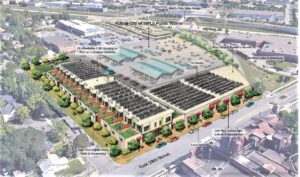BY DANIEL COLTEN SCHMIDT, EAST PHILLIPS RESIDENT
A chain is only as strong as its weakest link, and a society is only as prosperous as its most marginalized community. East Phillips Neighborhood Institute’s (EPNI) plan for a cooperatively owned indoor urban farm, massive solar array, community space and low-income housing complex would be a wealth generator, community safety net and clean energy resiliency hub. Although the indoor urban farm would serve the East Phillips community most directly because of its location, it would serve the whole city with nutritional food, carbon reduction, over 500 well-paying jobs, and renewable energy security in the case of disaster. By supporting our poorest communities, we raise the quality of life for the entire city.
The Roof Depot issue is one of self-determination and community participation in governance. With the intent to reduce pollution in the East Phillips neighborhood— whose population currently suffers some of the worst health disparities in the state— EPNI identified over $5 million to purchase the Roof Depot in 2015. In a turn of events, the city threatened to take the property through eminent domain, and bought the Roof Depot for almost $7 million. Over the last seven years, the city claims to have invested roughly $10 million in architectural plans and security. Now, after the city has created a mess of public discontent, Mayor Frey offered to sell the entire Roof Depot site to EPNI if they can repay the $17 million that the city spent frivolously on “planning” the massively unpopular project.

This artist’s rendering shows the proposed Urban Farm Project at the former site of Roof Depot in the East Phillips neighborhood of Minneapolis. (East Phillips Neighborhood Institute)
This is not the only time that Minneapolis city officials have made a mockery of the public participation law. In Ward 10, Public Works upended the community-designed Bryant Avenue reconstruction plans when they unveiled brand new blueprints days before construction, which no one from the community had ever seen. In Ward 5, Minneapolitans have been fighting for almost 15 years to stop burning waste at the Hennepin Energy Recovery Center (HERC), which spews lead and other toxic materials into our precious air. Now, the city is running sham public participation meetings to discuss the proposed new 3rd Precinct police station. The city is not asking “What does the community want?” Instead it is asking, “Do you want your police station where it used to be, or four blocks north?”
Do city officials find true public participation too onerous? The city is acting out of a paternalistic mindset. The city does not prioritize the health, nor the quality of life, nor the dignity of its citizens. Instead, it cuts deals with developers and financiers, and cudgels people for profit. If the city sells the Roof Depot to EPNI, it will not be for altruism. The city will have succeeded in funneling millions of Minnesota tax dollars to private sector individuals.
And yet the East Phillips neighborhood vision for an indoor urban farm begins a new era of reversing environmental racism. But more than the benefits gained through its infrastructure, the EPNI fight for the Roof Depot will be a victory for the environmental justice movement nationally. Solidarity across neighborhoods on issues of self-determination is the key to ensuring real community engagement is practiced here in Minneapolis. East Phillips’ fight for justice ripples outward to every neighborhood in the city.
Editor’s Note: Perhaps the best solution would be for Mayor Frey to look for a new site for the Water Department consolidation outside the city of Minneapolis on industrial land near highways, rather than contribute to the pollution of the inner city.






















